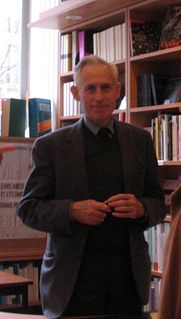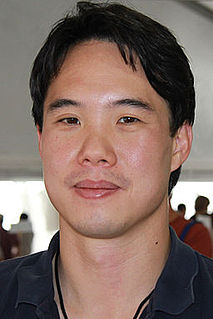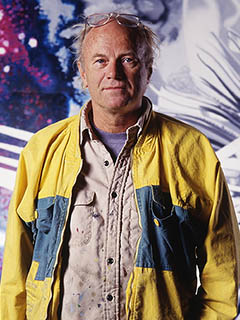A Quote by Richard Swinburne
It is crazy to postulate a trillion (causally unconnected) universes to explain the features of one universe, when postulating one entity (God) will do the job.
Related Quotes
However far back we may be able to trace the - so to speak - internal history of the Universe, there can be no question of arguing that this or that external origin is either probable or improbable. We do not have, and we necessarily could not have, experience of other Universes to tell us that Universes, or Universes with these particular features, are the work of Gods, or of Gods of this or that particular sort.
If we want to postulate a deity capable of engineering all the organized complexity in the world, either instantaneously or by guiding evolution, that deity must have been vastly complex in the first place. The creationist, whether a naive Bible-thumper or an educated bishop, simply postulates an already existing being of prodigious intelligence and complexity. If we are going to allow ourselves the luxury of postulating organized complexity without offering an explanation, we might as well make a job of it and simply postulate the existence of life as we know it!
nostalgia, underlying cosmological explanation for Weak but detectable interaction between two neighboring universes that are otherwise not causally connected. Manifests itself in humans as a feeling of missing a place one has never been, a place very much like one’s home universe, or as a longing for versions of one’s self that one will never, and can never know.
A Christian should know that God is a Creator, that God is an entity that is all-powerful and all knowledgeable, God is everywhere and God is an entity filled with grace, love, compassion and forgiveness, that Jesus is the son of God and Jesus came on earth to explain to people in a very revolutionary way the nature of God, that God was not a stern judge who was keeping track of 600 or so rules and regulations that you had to keep in order to be acceptable to God.
...the scientific attitude implies what I call the postulate of objectivity-that is to say, the fundamental postulate that there is no plan, that there is no intention in the universe. Now, this is basically incompatible with virtually all the religious or metaphysical systems whatever, all of which try to show that there is some sort of harmony between man and the universe and that man is a product-predictable if not indispensable-of the evolution of the universe.
It's worth noting that invoking God as the entity who set our universe in motion isn't contradicted by the data. Of course, scientists would say the supreme being hypothesis is faith, and outside the realm of science - that it's not amenable to experiment. But we currently have the same problem with the notion of parallel universes.
The other way is the multiverse way. That says that maybe the universe we are in is one of a very large number of universes. The vast majority will not contain life because they have the wrong gravitational constant or the wrong this constant or that constant. But as the number of universes climbs, the odds mount that a tiny minority of universes will have the right fine-tuning.
When someone refuses to listen to you or others, there is one source or entity that he will listen to: Call it God, the universe, a higher power, karmic law, whatever. At any rate, if he feels that the universe is trying to tell him something, then he may listen. He won't listen to you or anyone else, but the universe, that's a different story.
Scientists say, 'There is no such thing as time; gravity is a dust from another universe, and outside our own universe are many, many universes in all directions.' They speculate that attached to these universes are probably 6,000 planets identical to Earth. So are there things living out there? Animals, people, anything?
...if it isn't literally true that my wanting is causally responsible for my reaching, and my itching is causally responsible for my scratching, and my believing is causally responsible for my saying . . . If none of that is literally true, then practically everything I believe about anything is false and it's the end of the world.






































